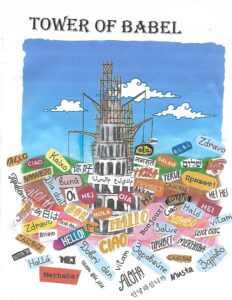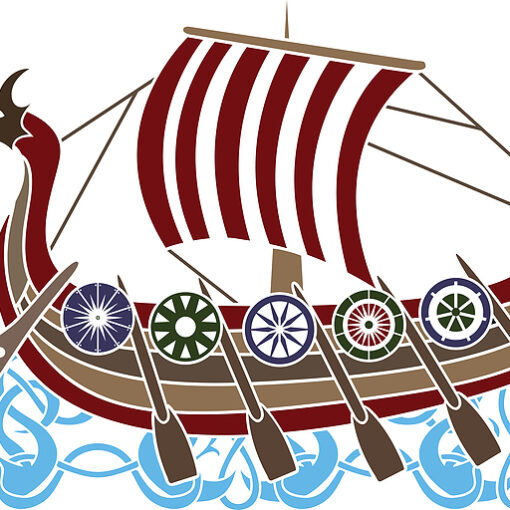
Our Americanized version of English is a conglomeration of words borrowed from different foreign languages. In fact, as John McWorter says in his book, The Power of Babel, the variety of the world’s languages is miraculous because “it is the product of a process of six thousand imperceptibly gradual transformations of what began as a single language that the first humans who began to speak language as we know it today lived in East Africa about 150,000 years ago.”
The History of Language
The fossil record places the origin of modern humans in East Africa between 150,000 to 200,000 years ago. While some believe that human language can be traced back to only about 35,000 years ago, McWhorter and others believe otherwise, that it was much earlier. They think that Homo sapiens led a cultural explosion because they were genetically predisposed to acquire and use language. Further, that this predisposition for language must have been created by a mutation, and that that mutation occurred once and was then passed on to all descendants rather than emerging at various later times in separate offshoot populations.
It is likely that one original language spread by migration, first to Asia, eventually migrating to Europe, while another group spread in two directions: “southeastward across Asia down to Australia and northeastward across the Bering Strait to the Americas.” It’s also likely that there were some migrations across the Pacific to the Americas, with language evolving as it traveled.
Words, Their Meaning and Pronunciation
Language evolved because it is always in the process of changing. Not only that, but meanings of words also change over time, as do their spellings. McWhorter says that seven hundred years ago, name was pronounced “NAH-muh” rather than “NEIGHm,” that silly meant ”innocent,” and double negatives were good grammar. The French language we know of today was spoken by no one because it did not yet exist. It was still Latin, which only developed into French through transformations of its “sounds, sentence structure, and most of its basic word meanings.”
In fact, language is inherently dynamic. Each year, words are added to dictionaries because new words evolve from older versions or come into being on their own. I’ll give you one example of the many transformations that McWhorter mentioned: “a thousand years ago, dog was pronounced “DAW-jah” (spelled docga) and was a secondary word rather like fowl is today; the usual word for dog in general was hund, which has limped down to us as the now marginal word hound.”
Latin is More Than Latin
I took Spanish in high school, while my best friend took Latin because she wanted to be a nurse. For those who don’t know, if you’ve studied Latin, you are able to understand the basis of medical and legal terms, as well as romance languages (French. Italian, Spanish, Portuguese, Romanian, and Catalan, among others). These romance languages evolved from what some called Vulgar Latin in the third to eighth centuries (Vulgar Latin is colloquial Latin spoken by the local population). McWhorter says French is nothing more than Modern Latin: Latin that changed through several centuries into a new language in the area that would become France.
Erosion of Sound
In fact, in all languages there is a tendency for sounds to erode and disappear over time, especially when the accent does not fall upon them. McWhorter says that this very process was part of what turned Latin into French, and not “sloppy” French but the formal French spoken in Paris.
He gave an example of those sounds that change over time. “At first there is a tendency to pronounce the sound less distinctly in casual, running speech…… A generation that grows up hearing the sound produced less distinctly most of the time gradually comes to take this lesser rendition of the sound as the ‘default.’ Meanwhile, they, too, follow the general and eternal tendency to pronounce unaccented sounds less distinctly and thus pronounce their ‘default’ version of the sound, already less distinct than the last generation’s, even less distinctly.
“The next generation takes this muffled sound as ‘default’; but when they in turn follow the natural tendency to pronounce this sound even less distinctly, this time there is so little left of the sound that to muffle it is to eliminate it completely. Thus, for them, the choice is between making the sound at all and leaving it off completely. Finally comes a generation for whom the ‘default’ is no sound in that position at all.” This erosion was particularly strong with prefixes and suffixes and was central in turning Latin into French.
The gradual erosion of a language’s sounds—especially the general instability in vowels in all languages—slowly renders old words into new ones, often barely recognizable as descendants of the originals. It also transforms the very grammar of the language. Have evolved from concretely meaning “to possess” to just indicating the pastness. Have, then, went from being a “real” verb into being a mere helping verb.
Going to the Dogs
In explaining another form of change, semantics, McWhorter expanded on his dog explanation: ”hund referred to any old dog, whereas dog (originally docga) began as the word for a mysterious breed of apparently large dogs. Hund, its thunder stolen, then narrowed into hound, referring to hunting dogs. Dog gradually broadened in its meaning to refer to all dogs as hund once had. This complementary narrowing and broadening often results in the word for even a basic object changing in a language through the years.”
Blessedly Silly
Again, using an earlier example, he explained that in Old English, the word that became silly means “blessed.” …Blessedness implies innocence; that kind of implication led people to gradually incorporate innocence into their conception of the word, and through time innocence ended up becoming the main connotation. By the Middle Ages, silly meant “innocent’’: about 1400, the meaning had strayed to deserving of compassion. But because deserving of compassion has a way of implying weakness, before long, the meaning of silly was weak (1533). From here it was a short step to “simple” or “ignorant,” and finally silly came to mean “foolish”—having begun meaning as sanctified by God”!
Here’s a few fun word changes and their history:
Have you ever wondered where the nick in nickname came from? The word began as ekename; in earlier English, eke meant “also” – your also name. Through time, because the word was used so often after an–-an ekename – people began to interpret the n in an as the first letter of the following word. Hence, nickname.
The name Santa Claus began in Dutch as Sant Heer Niclaes, “Saint Mr. Nickolas”–-in other words, St. Nicholas. Pronounced so often, it shortened to Santerclaes and eventually was reinterpreted in English as Santa Clause, far from its alternate “Saint Nick.”
In early England, a reeve was an estate manager The reeve of a county, or shire, was the shire reeve, or scìr gerèfa in Old English. Through time, gerèfa, because it did not have the accent, began to be pronounced less distinctly, and gradually became processed as just a sequence of sounds appended to the first word. The eventual result, with further sound changes, was our sheriff.
Shakespeare wrote in a period (as the 1500s became the 1600s) where English was just becoming what we would recognize as “our language.” Next time, I’ll delve into where Old English came from.




